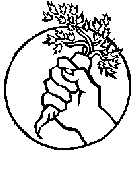
| Contents | Start | Previous | Next |
The manager there insisted we arrive at the door no earlier than 7:30 a.m. and no later than 7:35 a.m., exactly. If we were even a few minutes late, the manager would have already put the left-over muffins and bread in the trash compactor. During our first year, we missed only five days, and three of those had major snowstorms. As we were driving, we began to reminisce about the time we collected food for our first action, the soup line at the First National Bank of Boston stockholders' meeting, outside the Federal Reserve Bank in March 1981.
* * *
As nuclear-power protesters, we wanted to do street theater that would remind people of a l930s-style soup kitchen, to highlight the waste of valuable resources on capital-intensive projects such as nuclear power while many people in this country went hungry and homeless. At first, we thought we would have actors play the homeless, but then we realized we could get people who actually were homeless to participate and made an invitation we could distrilute at Pine Street and other shelters. We collected day-old bread from a bakery and some fruit and vegetables from the local co-op on the morning of the stockholders' meeting and cooked a huge pot of soup. We set up a table at the Federal Reserve Building, and to our surprise, over one hundred people showed up for a meal. This action was sponsored by a task force of the Clamshell Alliance to highlight how the directors of the bank, the nuclear utilities, and the building contractors were all interlocked, that is, they were all the same people. We weren't sure that we wouldn't be arrested, but we did it anyway. It was a tremendous success. Even some sympathetic stockholders stopped by and donated a dollar or two.
* * *
Our second street theater action was on August 20, 1981, outside a weapons bazaar at Boston University. The night before, we spray-painted the outline of "dead" bodies on the ground, stenciled mushroom clouds with the word "Today?" and wheat-pasted "War is Murder for Profit" posters along the route that the weapon buyers and sellers would take from their hotel to the conference hall. The day of the bazaar, we distributed free food and flyers protesting this profiteering from weapons of mass destruction. This literature also had the mushroom-cloud stencil on it, and we held signs that were also stenciled. Samuel Day of The Progressive wrote a great article about the contrast between the free meal outside and the ninety-dollar lunch he had with a general; he also mentioned that the general made sure that he didn't step on the spray-painted bodies.
After reminiscing and collecting the bread at the bakery in Harvard
Square, we proceeded to Fresh Pond, the only park in Cambridge where it
was legal to allow dogs to run off the leash. Our four dog friends, Jasmine,
Arrow, Sage, and Yoda, were very important members of the collective. They
made sure we got up every morning to do our food collection and take them
for their walk at Fresh Pond, and they also played an important role in
bringing the collective together in the first place. Jasmine had a litter
of puppies in the summer of 1980. Three of them were adopted by friends
who at the time lived in different houses in different neighborhoods; but
over the next year, these friends became closer, in part because of the
relationship of the dogs, and eventually all moved in together as the founding
members of the Food Not Bombs collective. Hence, Jasmine and three of her
puppies ended up living together as well. And every day, someone in the
col lective would go with the dogs to Fresh Pond for a walk. Sometimes
everyone would go for these walks and we would spend the time thinking
about and planning the future of the collective. It was on one such walk
that one of our most elaborate plans for a series of actions developed.

| Contents | Start | Previous | Next |